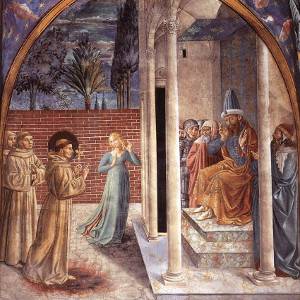
 ODAY MANY PEOPLE ARE PRAYING for peace, especially through the intercession of St Francis, who died on Oct 3 1226 and whose feast day we celebrate today.
ODAY MANY PEOPLE ARE PRAYING for peace, especially through the intercession of St Francis, who died on Oct 3 1226 and whose feast day we celebrate today.
I bet there will be a lot of people singing Sebastian Temple’s Make Me a Channel of Your Peace. Which is a great song, but I’d like to share a few others which today brings to mind.
But first a little about the illustration there.
The 14th century book, The Flowers of St Francis, relates how he went to visit the Sultan during the 5th Crusade:
Then St Francis standing before him, inspired by the Holy Spirit, preached most divinely the faith of Christ; and to prove the truth of what he said, professed himself ready to enter into the fire. Now the Sultan began to feel a great devotion towards him, both because of the constancy of his faith, and because he despised the things of this world (for he had refused to accept any of the presents which he had offered to him), and also because of his ardent wish to suffer martyrdom. From that moment he listened to him willingly, and begged him to come back often, giving both him and his companions leave to preach wheresoever they pleased; he likewise gave them a token of his protection, which would preserve them from all molestation.
There are a lot of discussions about how accurate that retelling was, but well worth reading.

 There is a little known hymn to St Francis beginning “Corda pia inflammantur” which can be translated as Godly hearts are inflamed. The tune is very simple – same for the refrain as for the verses. The text elaborates on St Francis receiving the stigmata. Go listen and share it. It makes a change from the Peace Prayer of St Francis.
There is a little known hymn to St Francis beginning “Corda pia inflammantur” which can be translated as Godly hearts are inflamed. The tune is very simple – same for the refrain as for the verses. The text elaborates on St Francis receiving the stigmata. Go listen and share it. It makes a change from the Peace Prayer of St Francis.
* * MP3: Corda Pia – one minute audio clip with two verses out of eleven and three repeats of the refrain. The singers are my mother, my son and myself.
* * PDF: Corda Pia – pages 50 & 51 from A New Book of Old Hymns

Another alternative to the Peace Prayer of St Francis is the antiphon “Da pacem.” The translation runs thus, “Grant peace, O Lord, in our days, as there is no other who will fight for us, except thee, our God.”
Here is Giovanni Vianini singing the antiphon paired with Psalm 121/122:
The psalm verses are:
I rejoiced at the things that were said to me: We shall go into the house of the Lord. Our feet were standing in thy courts, O Jerusalem. Jerusalem, which is built as a city, which is compact together.
This is also in a New Book of Old Hymns. In the book this antiphon is followed by the round setting by Melchior Franck. In the new edition I clarified how the parts fit together – it is a canon in the hypodiatessaron or the second part comes in a fourth below. Here is a pdf copy of the page:
* * PDF: Da pacem, Domine p70 of A New Book of Old Hymns

Now, you might have noticed that both those pieces are in Latin. Aren’t there any English hymns you can recommend?
There is a novena to St Francis carried out each year at the Maternal Heart of Mary Church in Sydney. They use the hymn by Shane Leslie which begins:
Francis, thou wast lonely plying
For thy bread from door to door
Till God heard thy bitter sighing
For His Wounds and for His poor.
You can find the whole novena with the hymn (and Corda Pia) here as a pdf taken from the listing of Mass Propers of the Saints
It appears in the Westminster Hymnal of 1958 (unfortunately not in the Old Westminster Hymnal which I wrote about earlier) The meter is 87.87. I will try to find the name of the tune! (In solfege it begins: re do re fa sol fa mi re – do you recognise it?)

Zenit is promoting a new book on St Francis by Fr Cantalamessa In Love with Christ: The Secret of Saint Francis of Assisi. They are selling through Createspace, which also sells A New Book of Old Hymns and The Old Westminster Hymnal. Just letting you know.
